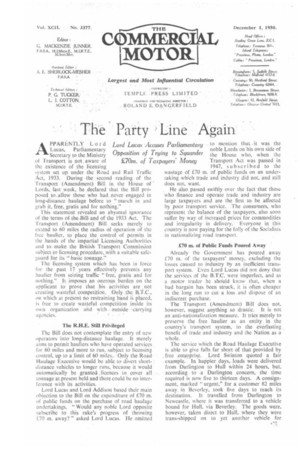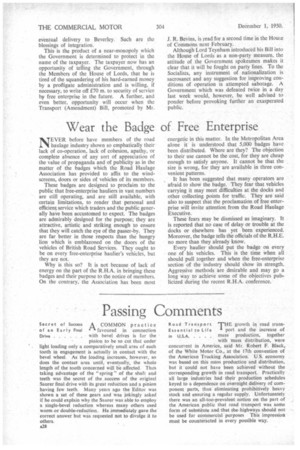The Party Line Again
Page 29

Page 30

If you've noticed an error in this article please click here to report it so we can fix it.
APPARENTLY Lord Lucas, Parliamentary Secretary to the Ministry of Transport is not aware of the existence of the ,licensing system set up under the Road and Rail Traffic Act, 1933. During-the second -reading of the Transport (Amendment) Bill in the House of Lords, lastweek, he .declared that the Bill proposed to:allow those who had, never engaged in long-distance • haulage before to "march in and grab it, freeegratis.and for nothing."
This statement revealed an abysmal ignorance of the terms of the,BilLand of the 19.33 Act. The Transport (Amendment) Bill seeks merely to extend to 60 miles the radius of operation of the free haulier, to place' the control of permits in the hands of the impartial Licensing Authorities and to make the British Transport Commission subject to licensing procednre,with a suitable safeguard for its " basic tonnage."
The licensing system which has been in force for the past 17 years effectively prevents any haulier from seizing traffic ". free, gratis and for noshing." It imposes an onerous, burden an the applicant to prove that his activities are , not creating wasteful competitioh. Only the .13,17.C., on which at present no restraining hand US placed, is free to create wasteful. competition inside its own organization and with outside.. -carrying agencies.
The R.H.E. Still Privileged The Bill does not contemplate the entry of new operators into' long-distance haulage. It merely aims to permit hauliers who have operated services for 60 miles and more to run, subject to licensing control, up to a limit of 60 miles-Only the Road Haulage Executive would be able to divert shortdistance vehicles to longer runs, because it would automatically be granted ;licences . to cover all tonnage at present held and there could be no interference with its activities_ Lord Lucas and Lord Addison based their main objection to the Bill on the expenditure of £70 m. of public funds on the purchase of road haulage undertakings. "Would any noble Lord opposite subscribe to this rake's progress of throwing £70 m. away?" asked Lord Lucas. He omitted to mention that . it was the noble Lords on his own side of the House who, when the Transport Act was passed in 1947, subscribed to the wastage of £70 m. of public funds on an undertaking which trade and industry did not, and still does not, want_ , He also, passed swiftly over the fact that those who finance and operate trade and industry are large .taxpayers and are the first to; be affected by poor transport service. The consumers, who represent the balance of the taxpayers, also soon sutler by way of increased prices for commodities and irregularity in delivery: Everyone in this country is now paying for the folly of the Socialists in nationalizing road transport.
£70 m. of Public Funds Poured Away Already the Government has poured away £70 tn. of the taxpayers' money, excluding the losses caused to industry by an inefficient transport system. Even Lord Lucas did not deny that the services of the B.T.C. were imperfect, and as a motor trader he shoruld know that, when a had bargain has been struck, it is often cheaper in the long run to cut a loss and dispose of an indiscreet purchase.
The Transport (Amendment) Bill does not, however, suggest anything so drastic. It is not an anti-nationalization measure. It tries merely to preserve the free haulier as an entity in the country's transport system, to the everlasting . benefit of trade and industry and the Nation as a whole.
The service which the Road Haulage Executive is able to give falls far short of that provided by free .enterprise. Lord Swinton quoted a fair example. In happier days,. loads were delivered from Darlington to Hull within 24 hours, but, according. to .a ' Darlington concern, .the time required is now five to thirteen days. A consignment, marked " urgent," for a customer 82 miles away. in Beverley., took five days to reach its destination. It travelled from Darlington to Newcastle, where it was transferred to a vehicle bound for Hull, via Beverley. The goods were, however, taken direct to Hull, where they were trans-shipped on to yet another vehicle for eventual delivery to Beverley. Such are the blessings of integration.
This is the product of a near-monopoly which the Government is determined to protect in the name of the taxpayer. The taxpayer now has an opportunity of telling the Government, through the Members of the House of Lords, that he is tired of the squandering of his hard-earned money by a profligate administration and is willing, if necessary, to write off £70 m. to security of service by free enterprise in the future. A further, and even better, opportunity will occur when the Transport (Amendment) Bill, promoted by Mr. J. R. Bevins, is read for a second time in the House of Commons next February.
Although Lord Teynham introduced his Bill into the House of Lords as a non-party measure, the attitude of the Government spokesmen makes it clear that it will be fought on party lines. To the Socialists, any instrument of nationalization is sacrosanct and any suggestion for improving conditions of operation is attempted sabotage. A Government which was defeated twice in a day last week would, however, be well advised to ponder before provoking further an exasperated public.












































































































